|
Limitar tu búsqueda
[+–] Compilador o editor
- Abrantes Pêgo, Raquel (2)
- Aguilera, Nelly (6)
- Anguiano Cárdenas, Rosa del Cármen (1)
- Castaleda Zainos, Marcos (1)
- Del Valle Muñoz, Alejandro (1)
- Durán, Luis (4)
- García Castelán, Alfonso (1)
- Garro, Nora (1)
- Giles Valdés, Rafael (1)
- González Rojas, Bertha Alicia (1)
- Hernández Sánchez, José Antonio (1)
- Linares Tirado, Rebeca (1)
- Martínez, Gabriel (3)
- Matute de Díaz, Zoila (1)
- Meléndez, Jorge (1)
- Méndez Suazo, Elmer (1)
- Palmero Zilveti, Olga (2)
- Ponce Aguilar, Luisa (1)
- Reyes Godelmann, Iker (2)
- Sobrevilla, Luis A. (1)
- Suárez, Rosa María (1)
- Valencia, Anel (1)
- Velázquez Franco, Emanuel (1)
[+–] Editorial
[+–] Fecha
[+–] Formato
[+–] Idioma
[+–] Tipo de documento
[+–] Tipo de recurso
[+–] Classification
|

|
|
Mainstreaming natural disaster risk management into social protection policies (and vice versa) in Latina America and the Caribbean
This paper presents and applies the social risk management (SRM) conceptual framework to examine links between disaster risk, hazards, vulnerability, risk management, and social protection (SP). The paper makes the case that it is important to mainstream social protection policies into the disaster risk management (DRM) agenda and, vice versa as a means to improve household and community...
|
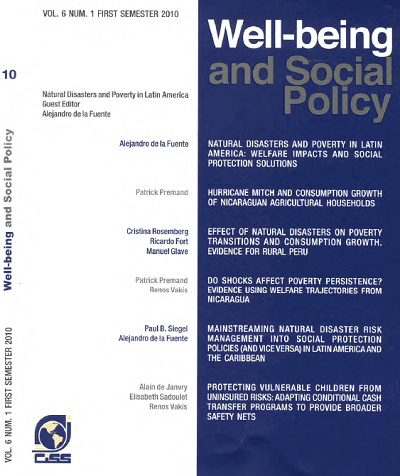
|
|
|
|

|
|
Do shocks affect poverty persistance? Evidence using welfare trajectories from Nicaragua
Shocks are often primarily associated with downward mobility or short-term movements in and out of poverty. However, households at the bottom of the welfare distribution are likely to face the most constraints to access insurance mechanisms. In this paper, we consider whether shocks directly affect poverty persistence. In order to analyze the impact of shocks on households’ welfare path over time...
|
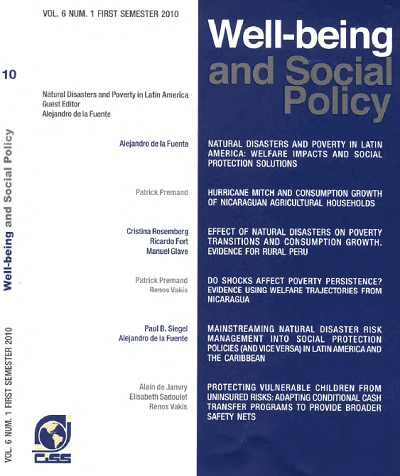
|
|
|
|

|
|
Effect of natural disasters on poverty transitions and consumption growth. Evidence for rural Peru
Natural hazards, an increasingly important phenomenon, have a direct impact at regional and household level. The growing incidence and persistence of natural events are strongly linked to increasing vulnerability of households and communities in developing countries. Previous socioeconomic vulnerabilities may exacerbate the impact of a specific event, making more difficult the process of...
|
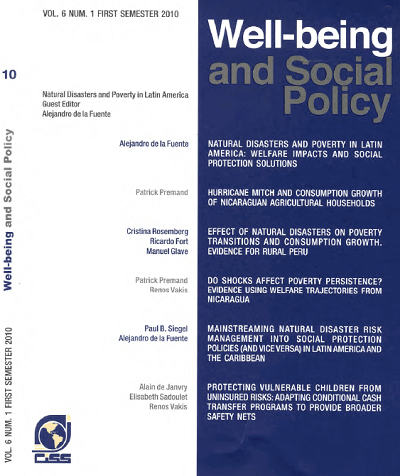
|
|
|
|

|
|
Hurricane Mitch and consumption growth of nicaraguan agricultural households
There is little micro-evidence on the persistence of natural disasters' welfare impacts. This paper assesses the effect of Hurricane Mitch on consumption of Nicaraguan agricultura) households. Mitch occurred in October 1998. Pre-post data is obtained from a nationally representative panel collected in 1998 and 2001. An additional survey was fielded in 1999 for households from the panel affected...
|
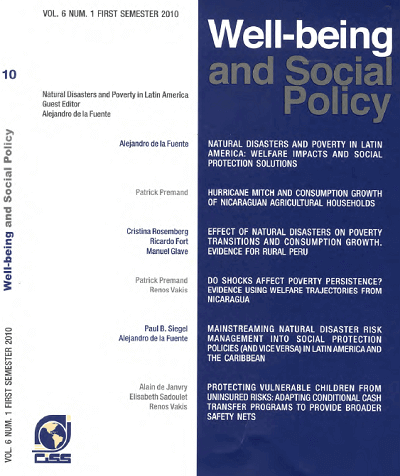
|
|
|
|

|
|
Natural disasters and poverty in Latin America: welfare impacts and social protection solutions
The Inter-American Conference on Social Security (CISS) and the United Nations Development Programme (UNDP) Office in Mexico jointly organized the conference “Natural Disasters in Latin America: Welfare Impacts and Social Protection Solutions” held in Mexico City in January 2010. The main objectives of the conference were to improve the understanding of (i) how natural disasters affect...
|
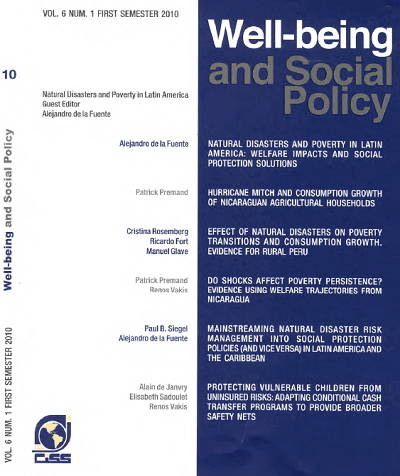
|
|
|
|

|
|
Book review. Informe de evaluación de la política de desarrollo social en México 2008, CONEVAL
The Evaluation Report on Social Development Policy in Mexico was published by the National Council for Social Development Policy Evaluation (CONEVAL) in 2008. The Council is one of the constituting elements of the new institutional framework to evaluate the public sector performance, particularly social development policies that were put in place mostly during the first decade of this century....
|
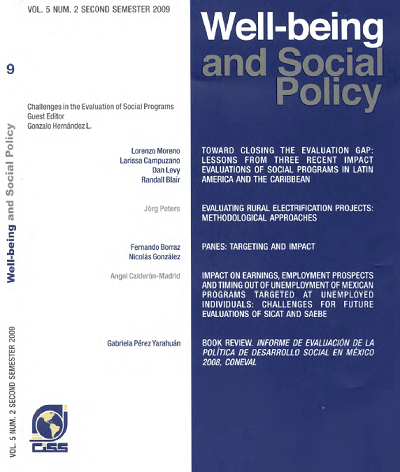
|
|
|
|

|
|
PANES: targeting and impact
This research paper intends to quantifit targeting performance in terms of the efficiency of the 1 National Plan for Social Emergency Assistance (PANES) implemented in Uruguay between 2005 and 2007 and determine its impact on relevant issues such as school attendance, child labor and the labor market. For this analysis , we used 2006 and 2007 Continual Household Survey (ECH) data.
Our outcomes...
|
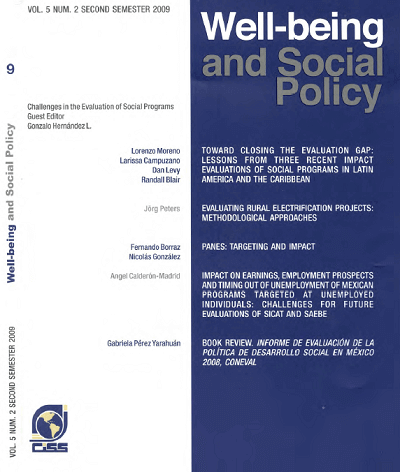
|
|
|
|

|
|
A simple poverty scorecard for Mexico
This study uses Mexico's 2008 National Household Survey of Income and Expenditure to I construct an easy-to-use scorecard that estimates the likelihood that a household has income below a given poverty line. The scorecard uses ten simple indicators that field workers can quickly collect and verify. Poverty scores can be computed on paper in the field in about five to ten minutes. The scorecard's...
|
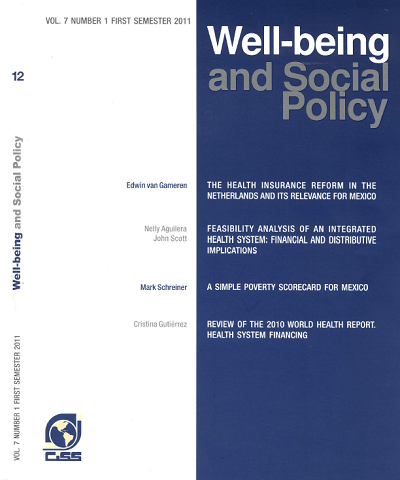
|
|
|
|

|
|
Book review. Beyond survival. Protecting households from health shocks in Latina America, by Baeza, Cristian C., y Truman G. Packard
The book by Cristian Baeza and Truman Packard is based on the next hypothesis: adverse health events reduce the consumption of goods and services different from health services, and many households become poor because of that. While the authors recognize that the evidence they present on the topic is limited, they propose the use of a “universal risk pool” as a way to eliminate the problem of...
|
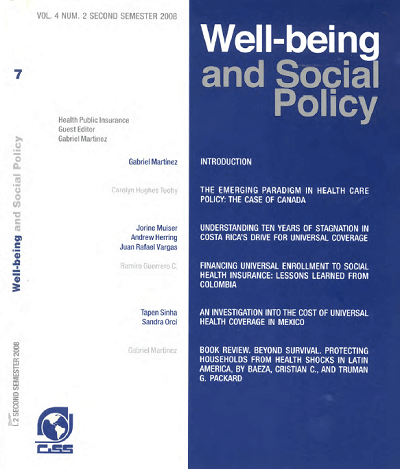
|
|
|
|

|
|
Book review. Public policy for an inclusive growth, edited by Pablo Cotler
The book “Public Policy for an Inclusive Growth” (The book) is an opportune and fortunate document. It is opportune because it is presented at a time in which public policy topics are subject to a wide debate in Mexico, and the discussion is fed with diverse points of view, theoretical and political, from which it is the purpose to analyze, design, redesign, implement, and evaluate the government...
|
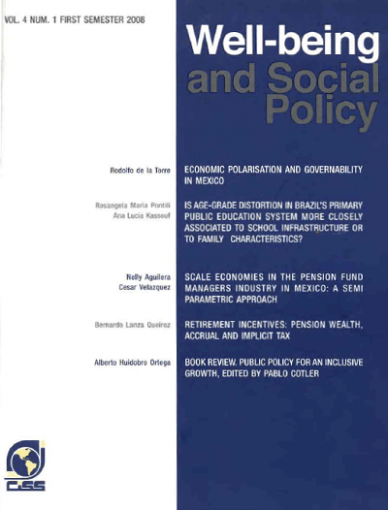
|
|
|
|

|
|
Introduction (on the subject that is addressed in the issue number)
In this issue of Well-being and Social Policy we have tried to include articles that support the debate around social insurance in health. This is an issue in which simple answers are hardly ever found, and a long term effort is required to understand the idiosyncrasy of each country and the best mix of regulation and financing options. Additionally, the studied cases point out to the need of a...
|
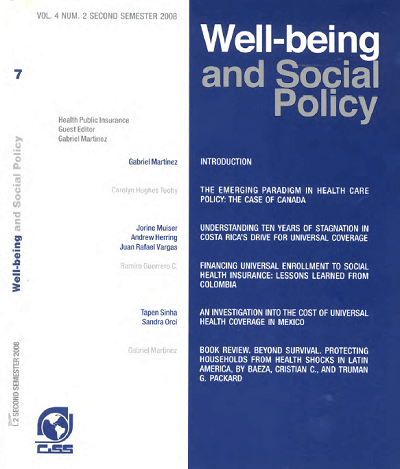
|
|
|
|

|
|
The emerging paradigm in heatlh care policy: the case of Canada
The model of health care financing and delivery for which Canada is best known internationally is its universal, single-payer, first-dollar system of coverage for physician and hospital services. For several decades following its establishment in the late 1950's and 1960's, this model provided public finance from the general tax base (like the UK), at levels of generosity, relative to GDP, like...
|
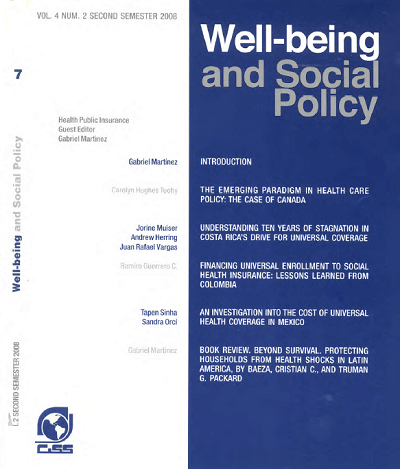
|
|
|
|

|
|
Understanding ten years of stagnation in Costa Rica's drive for universal coverage
This study analyzes achievements and obstacles in the process of moving towards universal coverage of essential health care services in Costa Rica. It describes the country as exemplary in the region, both in terms of population health status as well as health financing indicators. Life expectancy and the level of pre-payment are both comparable to high income countries. However, the process that...
|
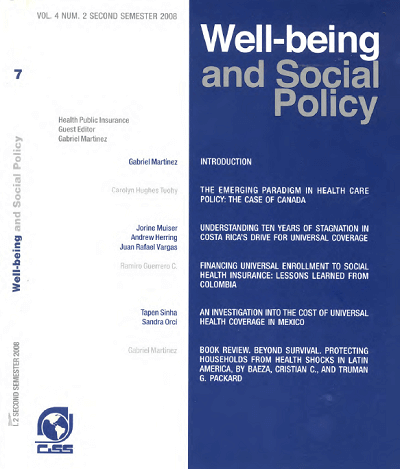
|
|
|
|

|
|
Financing universal enrollment to social health insurance: lessons learned from Colombia
The paper discusses the financing of the health care reform implemented in Colombia since the early nineties and explains the obstacles faced on the way to universal enrollment to social health insurance. The paper describes the reform and the sources created for its financing. It presents the observed trends in the financing of the insurance schemes created by the reform, identifies the...
|
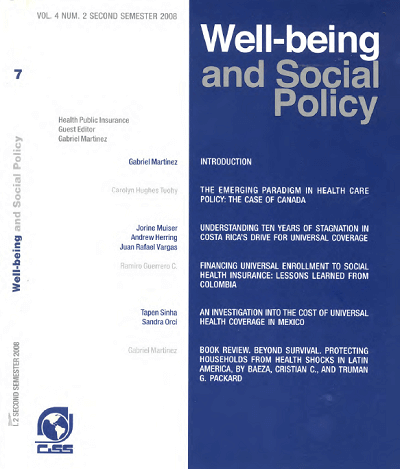
|
|
|
|

|
|
An investigation into the cost of universal health coverage in Mexico
The Mexican social security system, after operating for over six decades, has managed to provide healthcare for slightly over half the resident population.
There are wide geographical and socioeconomic variations in coverage. To provide wider coverage, the Federal Government created the Sistema de Protección Social en Salud (SPSS) for covering low income family. It becomes the third...
|
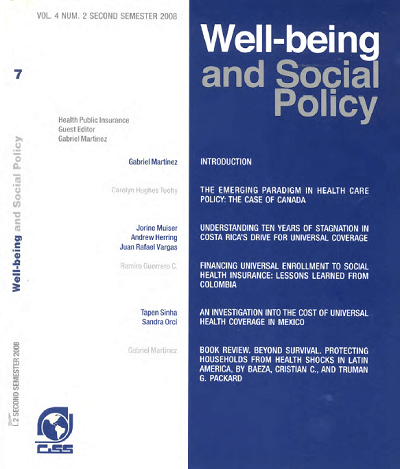
|
|
|
|

|
|
Financial development and the distribution of income in Latina America and the Caribbean
One of the central concerns in Latin America an the Caribbean (LAC) has been the reduction of poverty and inequality so prevalent in the continent. Using large world samples, the literature has found that financial development increases economic growth, increases the income of the poor, and reduces inequality. This paper studies the effects of financial development on the whole distribution of...
|
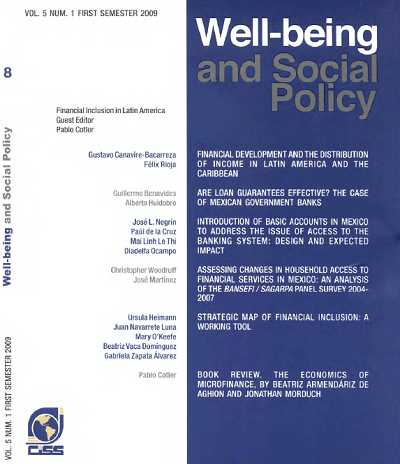
|
|
|
|

|
|
Evaluating rural electrification projects: methodological approaches
In recent years, the international community has expanded efforts in program evaluation to improve the accountability of development projects. This paper presents approaches to implementing state of the art evaluations in rural electrification projects, taking into account specific challenges that researchers face in such interventions. II suggests an approach to assess impacts before an...
|
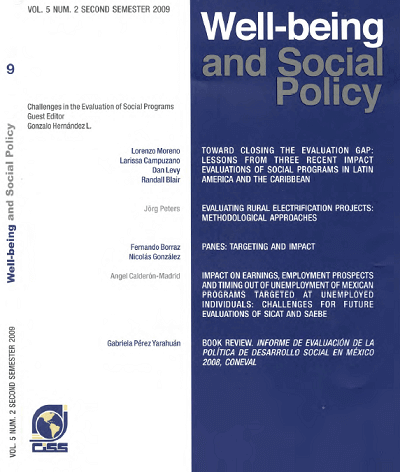
|
|
|
|

|
|
Are loan guarantees effective? The case of mexican government banks
Mexican Government’s Banks offer loan guarantees to private banks in order to spur credit directed to non-financial small and medium sized firms and this policy is examined here. Application of representative data to the comparative static analysis of the guarantee-use decision suggests that these schemes, as currently designed, are justifiable from an economic viewpoint. However, there is some...
|
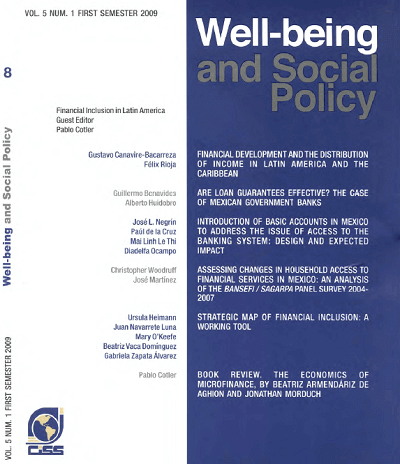
|
|
|
|

|
|
Introduction of basic accounts in Mexico to address the issue of access to the banking system: design and expected impact
This article presents the Mexican experience with the introduction of basic transaction accounts. Basic accounts are relatively cheap simple banking products with restricted functionality targeted at social groups that have limited access to transaction accounts. In Mexico, basic payroll accounts and accounts for the general public were introduced. By law, these products must be offered by all...
|
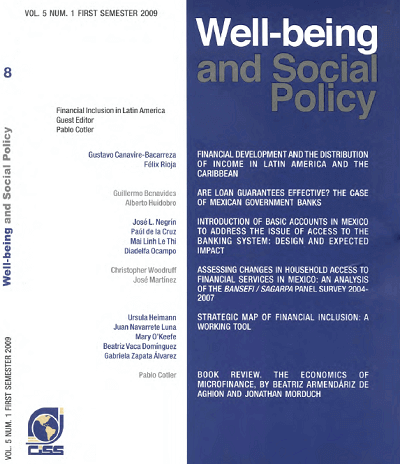
|
|
|
|

|
|
Assessing changes in household access to financial services in Mexico: an analysis of the BANSEFI/SAGARPA panel survey 2004-2007
In March 2004, BANSEFI and SAGARPA began a project to examine the impact on households I of the Program to Strengthen the Popular Credit and Savings Sector (Programa de Fortalecimiento del Sector de Ahorro y Crédito Popular), which was designed to help non-bank financial intermediaries to abide by the Ley de Ahorro y Crédito Popular (LACP), passed by the Mexican Congress in 2001. During the...
|
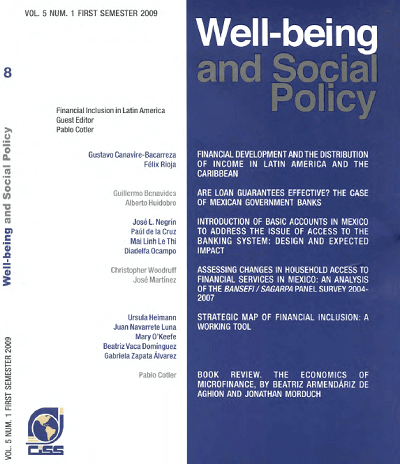
|
|
|
|
|